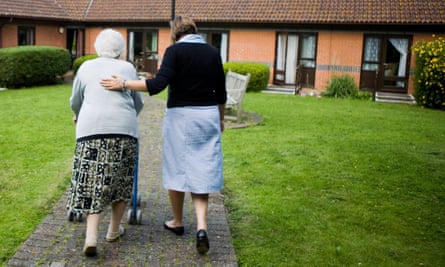A hard Brexit with deep cuts to immigration would force Britons into longer working lives in order to maintain a sustainable ratio of workers and pensioners, according to modelling conducted for the Guardian.
Rises in the state pension age are anticipated as a result of increased life expectancy and large numbers of baby boomers retiring. But further delays to pension payments will be necessary if current levels of immigration, which sustain the country’s old age dependency ratio, are not maintained, the Oxford University work indicates.
Prof Sarah Harper, the director of the Oxford Institute of Population Ageing and chair of the UK government’s foresight review on ageing societies, said: “The message from Brexit is if you don’t want immigrants, you’re going to have to work longer. That’s how the sums work.”
In the modelling, Harper’s team predicted that if migration were stopped, it would have a serious impact on workers, necessitating “far longer working lives”.
“Since the middle of the 20th century, the UK, like many other advanced economies, has employed migrant labour to reduce the ratio between older dependants and workers, which has arisen as child-bearing rates have fallen and people have lived longer,” said Harper, who also serves on the government’s science and technology council.
“However, if all migration into the UK was to be halted, then over the next five years, those coming up to retirement would have to work about one-and-a-half years longer just in order to maintain current output [of GDP]. Indeed, any significant reduction in labour immigration would wipe out the projected benefits to GDP of small delays in retirement, or require far longer working lives.”
The modelling was conducted for the Guardian’s new two-month investigation into the momentous social change that Britain’s ageing population will bring.
Life expectancy is growing by five hours a day. In 2014, the average age in the UK exceeded 40 for the first time. Almost a third of people born today can expect to live to 100. The implications for work, care, leisure, housing, business, taxation, family and relationships are formidable.
Harper also warned that if limits to immigration were introduced, the UK’s fertility rate, which is close to replacement level (about two births a woman), would drop, as women living in Britain who were born outside the UK have much higher birthrates than those born in the UK.
“If, because of Brexit, we limit migration, we will start ageing at the same rate as Greece, Italy and Spain,” said Harper. These countries are facing serious economic and social problems linked to declining populations caused by low birthrates - 1.3 births per woman in Greece, 1.32 in Spain and 1.37 in Italy, compared with 1.81 in the UK.
While Harper’s modelling was based on zero net migration, even reducing the number of people allowed into the country to a “low migration scenario” would have a significant effect on the state pension age.
John Cridland, the former CBI director who is reviewing the state pension age, told a recent conference run by the International Longevity Centre UK that the affordability of the state pension into the future had been made uncertain by “the Brexit factor”.

Pointing to a chart in his interim report published last October, which showed different projections of the old age dependency ratio into the future, Cridland said: “The reason this is a very unpredictable chart is migration – the Brexit factor.”
Even without changes to immigration, the number of dependants for every working adult is starting to rise in the UK. As a result, according to a report by the Resolution Foundation thinktank, the state pension age could be forced up to 70 by the late 2030s.
The foundation estimates that the size of the dependent population (broadly speaking, children and pensioners) will start to rise for the first time in decades. The report says there are seven dependants for every 10 people of working age at the moment, but this will increase to eight in the 2020s and nine by 2050.
“This decade marks the turning point in a transition to an ageing population in which the population of people aged 65+ is set to grow faster than that of working age,” said David Willetts, the executive chair of the Resolution Foundation. “While the UK population has steadily risen over the past 50 years, it is the balance within society between the young (aged under 20), old (aged 65 and over) and those of working age (age 20 to 64) – on whom the remainder are largely dependent – which is set to change most dramatically.
“For individuals, in simple terms, living longer will require an overall higher level of lifetime income to maintain a certain standard of living. With the large baby boomer cohort entering retirement, the concern is that younger generations face a need to balance achieving a higher lifetime income with the requirement to direct additional resources to support an ageing population.”
Effects of Brexit
Carl Emmerson, the deputy director of the Institute for Fiscal Studies, warned that an economic downturn caused by Brexit could mean extending older people’s working lives.
“If the government is struggling with its budget because of Brexit, it’s maybe more likely to bring in reforms that encourage people to work for longer,” he said. “If you have a ratio of retired people to working age that is increasing, in the long run you’ve got to think of ways of adapting: spending less when you’re working, having less when you retire, or working longer.
“It’s possible to adjust that ratio by having more people come in. If they stay just until they retire, then it’s great for the government. Also, immigrants often turn up after having been born and been educated – that’s often expensive too, the government tends to spend money on people before they enter the labour market and after they retire.”

Harper said as well as potentially delaying the age at which people were able to stop working, reductions in immigration could harm older people by depleting the numbers of social care workers in the country – one in 20 of whom are migrants from the European Economic Area – who do the bulk of caring for elderly people in care homes.
This would hit London hardest, where almost 11% of the social care workforce is made up of EEA migrants without British citizenship.
“We’re becoming older, we’re becoming frailer, we’re having fewer children and those children, particularly women, are not really working at home and are therefore not able to care for frail elderly relatives. So we need migrant healthcare workers because they’re the ones who are willing to do the work,” she said.
“When it comes to care we have a real problem: who is going to care for our older population if we’re not going to encourage lower-skilled people [to migrate]?”

Comments (…)
Sign in or create your Guardian account to join the discussion